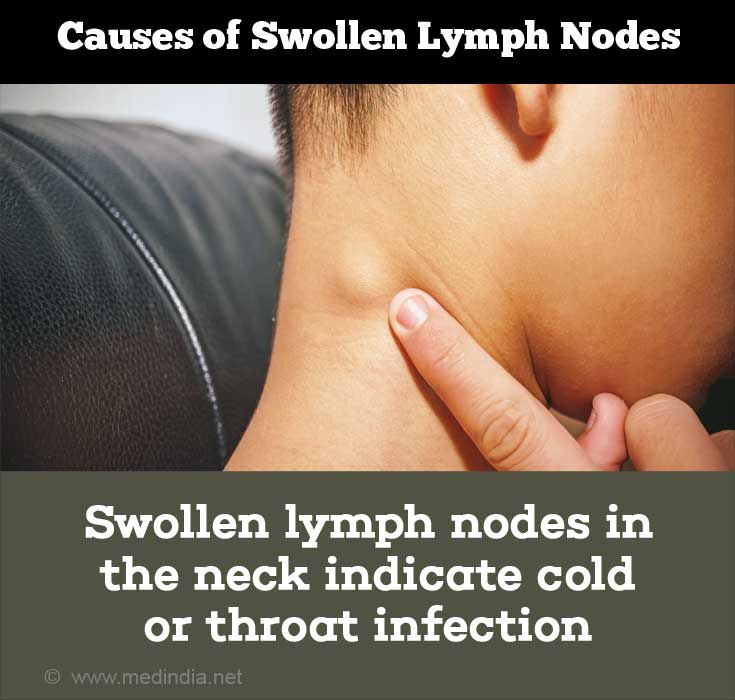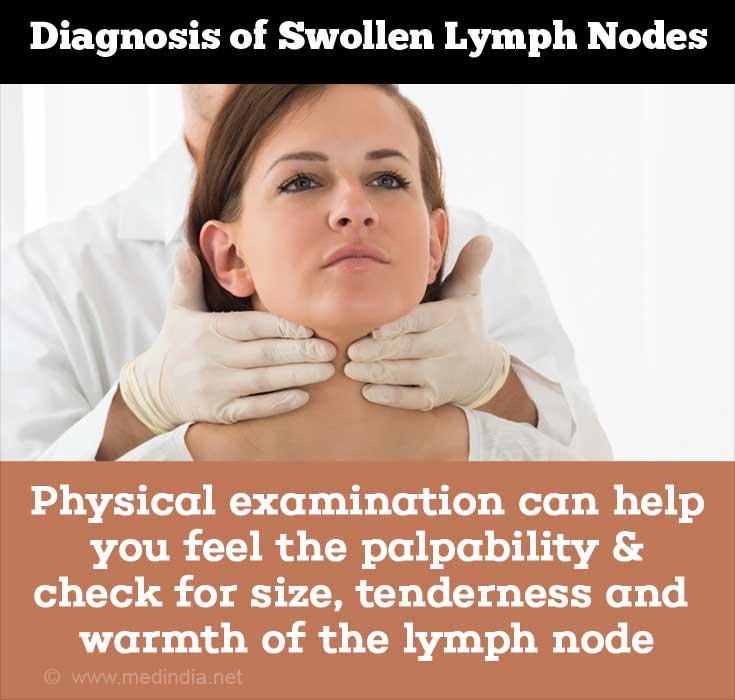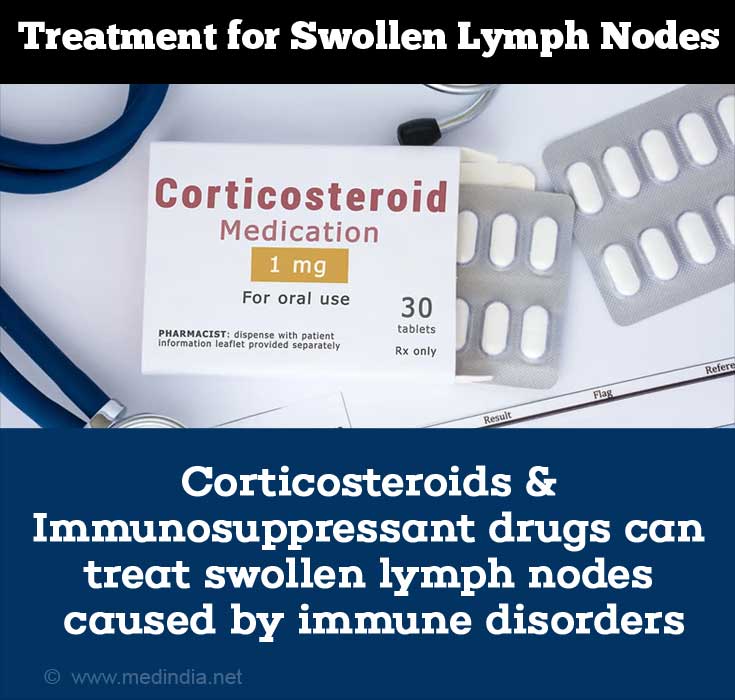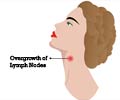- About Swollen Lymph Nodes - (https://my.clevelandclinic.org/health/diseases/15219-swollen-lymph-nodes)
- Why are My Lymph Nodes Swollen? - (https://www.medicalnewstoday.com/articles/324105.php#diagnosis)
- Swollen Lymph Nodes - Overview - (https://www.uofmhealth.org/health-library/aa65796spec)
- Lymph Nodes and Cancer - (https://www.cancer.org/cancer/cancer-basics/lymph-nodes-and-cancer.html)
- All You Need To Know About Swollen Lymph Nodes - (https://medlineplus.gov/ency/article/003097.htm)
- Swollen Lymph Nodes - (https://www.mayoclinic.org/diseases-conditions/swollen-lymph-nodes/symptoms-causes/syc-20353902)
What are Swollen Lymph Nodes?
The medical term for swollen lymph nodes is lymphadenopathy. Lymph nodes are small pea-size lumps of tissue found across the body. They are part of the lymphatic system, which carries lymph fluid, nutrients and waste material between the body tissues and the bloodstream. The lymph nodes play a vital role in the body’s immune system and are responsible for fighting bacteria, viruses and other biological agents causing infection. They filter lymph and destroy harmful foreign bodies with the aid of special white blood cells known as lymphocytes.(1✔ ✔Trusted Source
About Swollen Lymph Nodes
Go to source)
Lymph nodes occur singly or in groups. Clusters of lymph nodes can be felt in the neck area, armpits and groin. Swollen lymph nodes may or may not be tender. They vary in their consistency, may be hard or soft (if palpable).
What are the Causes of Swollen Lymph Nodes?
Swollen lymph nodes are tender and painful. The nodes usually swell and enlarge in response to an infection as it works to filter out the alien agents. The location of the swollen nodes can help identify the cause. For example, swollen lymph nodes behind the ear indicate ear infection. Common sites of swelling include the neck, underarms and groin.
- Swollen lymph nodes in the neck, below the jaw and behind the ear usually indicate cold or throat infection. Rare cause of swollen lymph nodes in these sites could be lymphoma (lymphatic system cancer).

- Swollen lymph nodes in the armpit indicate an infection in the arm or hand. Rare cause of swollen lymph nodes in these sites could be lymphoma or breast cancer.
- Swollen lymph nodes in the groin area indicate infections in the foot, leg, groin or genitals. Rare cause of swollen lymph nodes in these sites could be lymphoma, testicular cancer or melanoma.(2✔ ✔Trusted Source
Swollen Lymph Nodes - Overview
Go to source)
Swollen lymph nodes can be indicative of a range of cancers like leukaemia (blood, bone marrow cancer), osteosarcoma (bone tissue cancer) or other cancers that have metastasized into the lymph nodes.(3✔ ✔Trusted Source
Lymph Nodes and Cancer
Go to source)
Swollen lymph nodes are also indicative of certain immune system disorders like lupus (chronic inflammatory disease of the joints, skin, kidneys, blood, heart and lungs) or rheumatoid arthritis (chronic inflammatory disease affecting the tissue lining the joints).
What are the Symptoms associated with Swollen Lymph Nodes?
Swollen lymph nodes caused by minor infections usually resolve after the underlying infection clears. However, it is necessary to seek medical help if the swelling and enlargement continue accompanied by other symptoms such as fever, weight loss, sore throat or breathing problems. It is also necessary to check if the lymph nodes are hard in consistency. Swollen lymph nodes may or may not be tender.
An enlarged lymph node may cause symptoms by applying pressure on its adjacent structures. For example, it may press on to the windpipe, i.e. trachea, and cause breathing difficulties.
If untreated, swollen lymph nodes can lead to abscess formation. An abscess is a collection of pus caused by infections. Swollen lymph nodes can also lead to bacteraemia or bloodstream infection. This is serious and can cause sepsis and eventual organ failure and even death.(4Swollen Lymph Nodes
Go to source)
Diagnosis and Tests
- Physical exam: Clinicians usually take an initial medical history of the patient followed by a physical exam. The doctor will feel the lymph node for palpability and check for size, tenderness and warmth. Physical examination usually offers clues for further diagnosis.

- Blood tests: A blood routine examination that includes a complete blood count (CBC) is usually ordered by your doctor to get a clue about the underlying cause. Sometimes immunological tests may be run on the blood sample.
- Imaging: CT scans and chest x-rays may be recommended to check for tumors and other respiratory infections.
- Biopsy: This is usually the last resort if the doctor has not been able to detect the cause with the above tests. A sample from the lymph node or even the entire node may be taken for a microscopic examination. This is often a confirmatory test that gives a definitive diagnosis of the underlying condition.(5Why are My Lymph Nodes Swollen?
Go to source, 6✔ ✔Trusted Source
All You Need To Know About Swollen Lymph Nodes
Go to source)
What are the Treatment for Swollen Lymph Nodes?
Swollen lymph nodes caused by infections are usually treated with antibiotics. Swollen lymph nodes caused by immune disorders such as lupus or rheumatoid arthritis have specific treatment regimens including corticosteroids and immunosuppressant drugs. Swollen lymph nodes caused by cancer are treated with radiation, chemotherapy or surgery.











